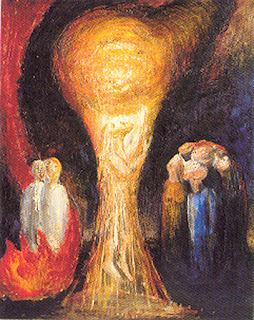The
Preacher’s Study
Seventh
Sunday of Easter, Year B
John W.B.
Hill
Acts 1:15-17,
21-26;
Psalm 1;
1 John 5:9-13;
John 17:6-19.
The first reading for this Sunday takes us back to that moment just
after the Ascension of the Lord, when the truth that was only hinted at in the
story of the walk to Emmaus (Luke 24:13-35)
has finally sunk in: now, and until he comes in glory, the presence of the
risen Christ is the presence of his
witnesses.[1] Now they realize that they are the ones God has sent into the world. Theirs is
the responsibility of ensuring that the world does not forget what God has done
through his Anointed One. As Jesus prays
in the gospel for this Sunday, “now I am no longer in the world, but they are
in the world, and I am coming to you...As you have sent me into the world, so I
have sent them into the world.”
It is clear that the horrifying scandal of Judas’ defection, and his
role in the arrest of Jesus, had reverberated through the earliest company of
disciples with a shock-wave of dismay, for we hear echoes of this tragic
betrayal in two of this Sunday’s readings.
It is a sombre reminder of the earth-shaking repercussions of Jesus’
life and death and resurrection, and a warning not to betray his trust in us,
even when the world hates us. Psalm 1 is
an ancient piece of wisdom about the danger of making such a mistake.
But the most important aspect of the reading from Acts is the focus it
gives to the critical role of the twelve apostles — so critical that the number
of them had to be filled out again! Why
were they so important? Peter gives the
answer when he spells out the necessary qualifications of any candidate for
that office: the person must “have accompanied us throughout the time that the
Lord Jesus went in and out among us, beginning with the baptism of John until
the day when he was taken up from us — one of these must become a witness with us to his resurrection.”
The Gospel reading takes us even deeper into the secret of the formation
of these apostles. John 17 is the
evangelist’s exploration of the mind of Christ about his disciples, cast in the
form of a prayer for them and for what they will be, once he is risen from the dead
and they have been restored in their loyalty to him. When that day comes, they will not only be
witnesses to what happened; they will have been formed by Jesus’ word of truth
because they will have finally received that word and will be keeping it, for
they will “know in truth that I came from you.”
They will have been sanctified (consecrated) by Jesus’ own
sanctification (his self-sacrifice).
“For their sakes I sanctify myself, so that they may be sanctified in
truth.” As the second reading puts it,
they will “have the testimony in their hearts.”
In later centuries, the Church would insist that the ‘apostolic
succession’ of its bishops attested the authenticity of the Church; yet it is
clearly impossible for any bishop to meet the qualifications spelled out by
Peter! The apostolic witness in Peter’s
sense will come from someone who was there. Of greater importance than all our subsequent
orders of ministry is the apostolic witness itself which is now mediated to us
through the writings of the New Testament, for its account of Christ and its
interpretation of Christ was validated by people who had known the apostolic
witness firsthand.
Thus the foremost responsibility of the ordained is to sustain the
Church’s dialogue with that apostolic witness (the holy scriptures) and to
order the Church’s life accordingly.
What we call ‘the apostolic succession’ is simply an acknowledgement
that we are not making this up; we are custodians of a tradition “built upon
the foundation of the apostles and prophets, with Jesus Christ himself as the
cornerstone.” (Ephesians 2:20) Apostolic succession is not the foundation of the Church; Christ is the foundation. Apostolic succession is also not the defining
identity of the Church; baptism into Christ is the defining
identity.
New disciples need to be assured, therefore, that their calling to
“confess the faith of Christ crucified, proclaim his resurrection, and share in
his eternal priesthood” is a real calling.
In a Church that is still deeply clericalized, they may be tempted to
think their calling is to support the calling of the clergy. But all disciples are called to be witnesses
to the resurrection of the Lord (with the support and guidance of the
clergy). The Church is not an
organization of Professional Christians and their patrons. We are called to be the living presence of
the risen Lord by becoming the story we tell.
We must be formed as witnesses by hearing the word of truth and
receiving it. Then we too will have the
testimony in our hearts, thanks to the witness of those apostles of old and the
indwelling Spirit of Jesus. That is the
gift of Pentecost for which we wait, constantly devoting ourselves to prayer (Acts 1:12-14).
John W. B. Hill, an Anglican presbyter
living in Toronto, Canada, is a Council member of APLM, chair of Liturgy
Canada, and author of one of the first Anglican sources for catechumenal
practice. He will be one of the featured speakers at this summer’s conference
co-sponsored by APLM and Journey to Baptismal Living: NAAC https://journeytobaptism.org/
“Supper at
Emmaus,” by Francis Newton Souza.
“The
Ascension,” by Peter Rogers.
“The
Ascension of Jesus,” by Miki de Goodaboom
[1] “When he was at table with them,
he took bread, blessed and broke it, and gave it to them. Then their eyes were opened, and they
recognized him; and he vanished from
their sight. They said to each
other, “Were not our hearts burning within us while he was talking to us on the
road, while he was opening the scriptures to us?” (verses 30-32)












